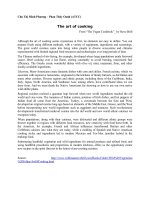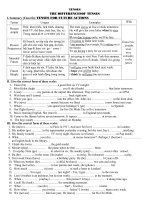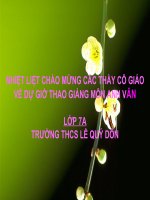The garden of allah
Bạn đang xem bản rút gọn của tài liệu. Xem và tải ngay bản đầy đủ của tài liệu tại đây (1.91 MB, 493 trang )
TheProjectGutenbergEBookofTheGardenOfAllah,byRobertHichens
ThiseBookisfortheuseofanyoneanywhereatnocostandwith
almostnorestrictionswhatsoever.Youmaycopyit,giveitawayor
re-useitunderthetermsoftheProjectGutenbergLicenseincluded
withthiseBookoronlineatwww.gutenberg.org
Title:TheGardenOfAllah
Author:RobertHichens
ReleaseDate:April11,2006[EBook#3637]
LastUpdated:September24,2016
Language:English
***STARTOFTHISPROJECTGUTENBERGEBOOKTHEGARDENOFALLAH***
ProducedbyDagny;JohnBickers;DavidWidger
THEGARDENOFALLAH
ByRobertHichens
PREPARER’SNOTE
Thistextwaspreparedfromaneditionpublishedby
Grosset&Dunlap,NewYork.
Itwasoriginallypublishedin1904.
CONTENTS
THEGARDENOFALLAH
BOOKI.PRELUDE
CHAPTERI
CHAPTERII
CHAPTERIII
CHAPTERIV
CHAPTERV
CHAPTERVI
BOOKII.THEVOICEOFPRAYER
CHAPTERVII
CHAPTERVIII
CHAPTERIX
BOOKIII.THEGARDEN
CHAPTERX
CHAPTERXI
CHAPTERXII
CHAPTERXIII
CHAPTERXIV
CHAPTERXV
BOOKIV.THEJOURNEY
CHAPTERXVI
CHAPTERXVII
CHAPTERXVIII
CHAPTERXIX
CHAPTERXX
CHAPTERXXI
CHAPTERXXII
CHAPTERXXIII
CHAPTERXXIV
CHAPTERXXV
BOOKV.THEREVELATION
CHAPTERXXVI
BOOKVI.THEJOURNEYBACK
CHAPTERXXVII
CHAPTERXXVIII
CHAPTERXXIX
CHAPTERXXX
CHAPTERXXXI
THEGARDENOFALLAH
BOOKI.PRELUDE
CHAPTERI
The fatigue caused by a rough sea journey, and, perhaps, the consciousness
thatshewouldhavetobedressedbeforedawntocatchthetrainforBeni-Mora,
preventedDominiEnfildenfromsleeping.TherewasdeepsilenceintheHotel
delaMeratRobertville.TheFrenchofficerswhotooktheirpensiontherehad
long since ascended the hill of Addouna to the barracks. The cafes had closed
their doors to the drinkers and domino players. The lounging Arab boys had
deserted the sandy Place de la Marine. In their small and dusky bazaars the
Israelites had reckoned up the takings of the day, and curled themselves up in
gaudyquiltsontheirlowdivanstorest.Onlytwoorthreegendarmeswerestill
about, and a few French and Spaniards at the Port, where, moored against the
wharf,laythesteamerLe GeneralBertrand,inwhichDominihadarrivedthat
eveningfromMarseilles.
InthehotelthefairandplumpItalianwaiter,whohaddriftedtoNorthAfrica
from Pisa, had swept up the crumbs from the two long tables in the salle-amanger,smokedathin,darkcigaroveracopyoftheDepecheAlgerienne, put
the paper down, scratched his blonde head, on which the hair stood up in
bristles,staredforawhileatnothinginthefirmmannerofwearymenwhoare
at the same time thoughtless and depressed, and thrown himself on his narrow
bed in the dusty corner of the little room on the stairs near the front door.
Madame,thelandlady,hadlaidasideherfrontandsaidherprayertotheVirgin.
Monsieur,thelandlord,had mutteredhislastcurseagainsttheJewsanddrunk
hislastglassofrum.Theysnoredlikehonestpeoplerecruitingtheirstrengthfor
themorrow.InnumbertwoSuzanneCharpot,Domini’smaid,wasdreamingof
theRuedeRivoli.
ButDominiwithwide-openeyes,wasstaringfromherbig,squarepillowat
theredbrickfloorofherbedroom,onwhichstoodvarioustrunksmarkedbythe
officials of the Douane. There were two windows in the room looking out
towardsthePlacedelaMarine,belowwhichlaythestation.Closedpersiennes
of brownish-green, blistered wood protected them. One of these windows was
open.YetthecandleatDomini’sbedsideburntsteadily.Thenightwaswarmand
quiet,withoutwind.
Asshelaythere,Doministillfeltthemovementofthesea.Thepassagehad
been a bad one. The ship, crammed with French recruits for the African
regiments, had pitched and rolled almost incessantly for thirty-one hours, and
Domini and most of the recruits had been ill. Domini had had an inner cabin,
withaskylightopeningontothelowerdeck,andheardabovethesoundofthe
wavesandwindstheirgroansandexclamations,roughlaughter,andhalf-timid,
half-defiantconversationsassheshookinherberth.AtMarseillesshehadseen
themcomeonboard,onebyone,dressedineveryvarietyofpoorcostume,each
onelookinganxiouslyaroundtoseewhattheotherswerelike,eachonecarrying
a mean yellow or black bag or a carefully-tied bundle. On the wharf stood a
Zouave,intremendousredtrousersandafez,amonggreatheapsofdullbrown
woollenrugs.Andastherecruitscamehesitatinglyalonghestoppedthemwitha
sharpword,examinedtheticketstheyheldout,gaveeachonearug,andpointed
tothegangwaythatledfromthewharftothevessel.Domini,thenleaningover
therailoftheupperdeck,hadnoticedthedifferentexpressionswithwhichthe
recruitslookedattheZouave.Toallofthemhewasaphenomenon,amysteryof
Africa and of the new life for which they were embarking. He stood there
impudently and indifferently among the woollen rugs, his red fez pushed well
back on his short, black hair cut en brosse, his bronzed face twisted into a
grimaceoffierycontempt,throwing,withhisbigandmusculararms,rugafter
rug to the anxious young peasants who filed before him. They all gazed at his
legsinthebillowingredtrousers;somelikechildrenregardingaJack-in-the-box
which had just sprung up into view, others like ignorant, but superstitious,
peoplewhohadunexpectedlycomeuponashrinebythewayside.Oneortwo
seemed disposed to laugh nervously, as the very stupid laugh at anything they
see for the first time. But fear seized them. They refrained convulsively and
shambled on to the gangway, looking sideways, like fowls, and holding their
rugsawkwardlytotheirbreastswiththeirdirty,redhands.
ToDominitherewassomethingpitifulinthesightofalltheselads,uprooted
fromtheirhomesinFrance,stumblinghelplesslyonboardthisshipthatwasto
convey them to Africa. They crowded together. Their poor bundles and bags
jostledoneagainsttheother.Withtheirclumsybootstheytrodoneachother’s
feet. And yet all were lonely strangers. No two in the mob seemed to be
acquaintances. And every lad, each in his different way, was furtively on the
defensive, uneasily wondering whether some misfortune might not presently
cometohimfromoneoftheseunknownneighbours.
Afewoftherecruits,astheycameonboard,lookedupatDominiassheleant
overtherail;andinallthedifferentcolouredandshapedeyesshethoughtshe
readasimilardreadandnervoushopethatthingsmightturnoutprettywellfor
theminthenewexistencethathadtobefaced.TheZouave,whollycarelessor
unconscious of the fact that he was an incarnation of Africa to these raw
peasants, who had never before stirred beyond the provinces where they were
born, went on taking the tickets, and tossing the woollen rugs to the passing
figures, and pointing ferociously to the gangway. He got very tired of his task
towardstheend,andshowedhisfatiguetothelatestcomers,shovingtheirrugs
intotheirarmswithbrusqueviolence.Andwhenatlengththewharfwasbarehe
spatonit,rubbedhisshort-fingered,sunburnthandsdownthesidesofhisblue
jacket, and swaggered on board with the air of a dutiful but injured man who
longedtodoharmintheworld.Bythistimetheshipwasabouttocastoff,and
therecruits,rangedinlinealongthebulwarksofthelowerdeck,werelookingin
silence towards Marseilles, which, with its tangle of tall houses, its forest of
masts, its long, ugly factories and workshops, now represented to them the
wholeofFrance.Thebronchialhootofthesirenroseupmenacingly.Suddenly
two Arabs, in dirty white burnouses and turbans bound with cords of camel’s
hair,camerunningalongthewharf.Thesirenhootedagain.TheArabsbounded
overthegangwaywithgravefaces.Alltherecruitsturnedtoexaminethemwith
amixtureofsuperiorityanddeference,suchasaschoolboymightdisplaywhen
observing the agilities of a tiger. The ropes fell heavily from the posts of the
quayintothewater,andweredrawnupdrippingbythesailors,andLeGeneral
Bertrandbegantomoveoutslowlyamongthemotionlessships.
Domini,lookingtowardsthelandwiththevagueandyetinquiringglanceof
thosewhoaregoingouttosea,noticedthechurchofNotredamedelaGarde,
perched on its high hill, and dominating the noisy city, the harbour, the cold,
greysquadronsoftherocksandMonteCristo’sdungeon.Atthetimeshehardly
knew it, but now, as she lay in bed in the silent inn, she remembered that,
keepinghereyesuponthechurch,shehadmurmuredaconfusedprayertothe
BlessedVirginfortherecruits.Whatwastheprayer?Shecouldscarcelyrecallit.
Awoman’spetition,perhaps,againstthetemptationsthatbesetmenshiftingfor
themselves in far-off and dangerous countries; a woman’s cry to a woman to
watchoverallthosewhowander.
Whenthelandfaded,andthewhitesearose,lessromanticconsiderationstook
possessionofher.Shewishedtosleep,anddrankadoseofadrug.Itdidnotact
completely,butonlynumbedhersenses.Throughthelonghoursshelayinthe
dark cabin, looking at the faint radiance that penetrated through the glass
shuttersoftheskylight.Therecruits,humanisedanddrawntogetherbymisery,
werebecomingacquainted.Theincessantmurmuroftheirvoicesdroppeddown
to her, with the sound of the waves, and of the mysterious cries and creaking
shudders that go through labouring ships. And all these noises seemed to her
hoarseandpathetic,suggestive,too,ofdanger.
WhentheyreachedtheAfricanshore,andsawthelightsofhousestwinkling
uponthehills,thepalerecruitsweremarshalledonthewhiteroadbyZouaves,
whometthemfromthebarracksofRobertville.Alreadytheylookedolderthan
theyhadlookedwhentheyembarked.Dominisawthemmarchawayupthehill.
Theystillclungtotheirbagsandbundles.Someofthem,liftingshakyvoices,
triedtosinginchorus.OneoftheZouavesangrilyshoutedtothemtobequiet.
They obeyed, and disappeared heavily into the shadows, staring about them
anxiouslyatthefeatherypalmsthatclusteredinthisnewanddarkcountry,and
attheshroudedfiguresofArabswhometthemontheway.
The red brick floor was heaving gently, Domini thought. She found herself
wonderinghowthecanechairbythesmallwardrobekeptitsfooting,andwhy
thecrackedchinabasinintheironwashstand,paintedbrightyellow,didnotstir
andrattle.Herdressing-bagwasopen.Shecouldseethesilverbacksandtopsof
the brushes and bottles in it gleaming. They made her think suddenly of
England.Shehadnoideawhy.ButitwastoowarmforEngland.There,inthe
autumn time, an open window would let in a cold air, probably a biting blast.
Thewoodenshutterwouldbeshaking.Therewouldbe,perhaps,asoundofrain.
AndDominifoundherselfvaguelypityingEnglandandthepeoplemewedupin
itforthewinter.Yethowmanywintersshehadspentthere,dreamingofliberty
and doing dreary things—things without savour, without meaning, without
salvationforbrainorsoul.Hermindwasstilldulledtoacertainextentbythe
narcoticshehadtaken.Shewasastrongandactivewoman,withlonglimbsand
well-knitmuscles,acleverfencer,atirelessswimmer,afinehorsewoman.But
to-nightshefeltalmostneurotic,likeoneoftheweakordissipatedsisterhoodfor
whom“restcures”areinvented,andbywhomblanddoctorslive.Thatheaving
red floor continually emphasised for her her present feebleness. She hated
feebleness. So she blew out the candle and, with misplaced energy, strove
resolutelytosleep.Possiblyherresolutiondefeateditsobject.Shecontinuedina
conditionofdullandheavywakefulnesstillthedarknessbecameintolerableto
her.Initshesawperpetuallythelongprocessionofthepalerecruitswindingup
the hill of Addouna with their bags and bundles, like spectres on a way of
dreams.Finallysheresolvedtoacceptasleeplessnight.Shelithercandleagain
andsawthatthebrickfloorwasnolongerheaving.Twoofthebooksthatshe
called her “bed-books” lay within easy reach of her hand. One was Newman’s
DreamofGerontius,theotheravolumeoftheBadmintonLibrary.Shechosethe
formerandbegantoread.
Towards two o’clock she heard a long-continued rustling. At first she
supposed that her tired brain was still playing her tricks. But the rustling
continuedandgrewlouder.Itsoundedlikeanoisecomingfromsomethingvery
wide, and spread out as a veil over an immense surface. She got up, walked
acrossthefloortotheopenwindowandunfastenedthepersiennes.Heavyrain
wasfalling.Thenightwasveryblack,andsmeltrichanddamp,asifitheldin
its arms strange offerings—a merchandise altogether foreign, tropical and
alluring.Asshestoodthere,facetofacewithawonderthatshecouldnotsee,
DominiforgotNewman.Shefeltthebravecompanionshipofmystery.Initshe
divinedthebeatingpulses,thehot,surgingbloodoffreedom.
She wanted freedom, a wide horizon, the great winds, the great sun, the
terriblespaces,theglowing,shimmeringradiance,thehot,entrancingmoonsand
bloomy, purple nights of Africa. She wanted the nomad’s fires and the acid
voicesoftheKabyledogs.Shewantedtheroarofthetom-toms,thedashofthe
cymbals,therattleofthenegroes’castanets,thefluttering,paintedfiguresofthe
dancers.Shewanted—morethanshecouldexpress,morethansheknew.Itwas
there, want, aching in her heart, as she drew into her nostrils this strange and
wealthyatmosphere.
When Domini returned to her bed she found it impossible to read any more
Newman. The rain and the scents coming up out of the hidden earth of Africa
hadcarriedhermindaway,asifonamagiccarpet.Shewascontentnowtolie
awakeinthedark.
Domini was thirty-two, unmarried, and in a singularly independent—some
might have thought a singularly lonely—situation. Her father, Lord Rens, had
recentlydied,leavingDomini,whowashisonlychild,alargefortune.Hislife
had been a curious and a tragic one. Lady Rens, Domini’s mother, had been a
great beauty of the gipsy type, the daughter of a Hungarian mother and of Sir
HenryArlworth,oneofthemostprominentandardentEnglishCatholicsofhis
day.Asonofhisbecameapriest,andafamouspreacherandwriteronreligious
subjects. Another child, a daughter, took the veil. Lady Rens, who was not
clever,althoughshewasatonetimealmostuniversallyconsideredtohavethe
faceofamuse,sharedinthefamilyardourfortheChurch,butwasfartoofond
of the world to leave it. While she was very young she met Lord Rens, a
Lifeguardsman of twenty-six, who called himself a Protestant, but who was
reallyquitehappywithoutanyfaith.Hefellmadlyinlovewithherand,inorder
tomarryher,becameaCatholic,andevenaverydevoutone,aidinghiswife’s
Churchbyeverymeansinhispower,givinglargesumstoCatholiccharities,and
working,withalmostfieryzeal,forthespreadofCatholicisminEngland.
Unfortunately,hisnewfaithwasfoundedonlyonloveforahumanbeing,and
whenLadyRens,whowasintenselypassionateandimpulsive,suddenlythrew
all her principles to the winds, and ran away with a Hungarian musician, who
had made a furor one season in London by his magnificent violin-playing, her
husband,strickeninhissoul,andalsowoundedalmosttothedeathinhispride,
abandonedabruptlythereligionofthewomanwhohadconvertedandbetrayed
him.
Domini was nineteen, and had recently been presented at Court when the
scandal of her mother’s escapade shook the town, and changed her father in a
day from one of the happiest to one of the most cynical, embittered and
despairing of men. She, who had been brought up by both her parents as a
Catholic,whohadfromherearliestyearsbeenearnestlyeducatedinthebeauties
ofreligion,wasnowexposedtothealmostfranticpersuasionsofafatherwho,
hating all that he had formerly loved, abandoning all that, influenced by his
faithlesswife,hehadformerlyclungto,wishedtocarryhisdaughterwithhim
intohisnewandmostmiserablewayoflife.ButDomini,who,withmuchofher
mother’sdarkbeauty,hadinheritedmuchofherquickvehemenceandpassion,
was also gifted with brains, and with a certain largeness of temperament and
clearnessofinsightwhichLadyRenslacked.Evenwhenshewasstillquivering
undertheshockandshameofhermother’sguiltandherownsolitude,Domini
was unable to share her father’s intensely egoistic view of the religion of the
culprit.Shecouldnotbepersuadedthatthefaithinwhichshehadbeenbrought
upwasprovedtobeashambecauseoneofitsprofessors,whomshehadabove
allotherslovedandtrusted,hadbrokenawayfromitsteachingsanddefiedher
ownbelief.Shewouldnotsecedewithherfather;butremainedintheChurchof
the mother she was never to see again, and this in spite of extraordinary and
doggedeffortsonthepartofLordRenstoperverthertohisownAtheism.His
mindhadbeensowarpedbytheagonyofhisheartthathehadcometofeelasif
by tearing his only child from the religion he had been led to by the greatest
sinner he had known, he would be, in some degree at least, purifying his life
tarnished by his wife’s conduct, raising again a little way the pride she had
trampledinthedust.
Heruncle,FatherArlworth,helpedDominibyhissupportandcounselinthis
criticalperiodofherlife,andLordRensintimeceasedfromtheendeavourto
carryhischildwithhimascompanioninhistragicjourneyfromloveandbelief
tohatredanddenial.Heturnedtotheviolentoccupationsofdespair,andthelast
yearsofhislifewerehideousenough,astheworldknewandDominisometimes
suspected.ButthoughDominihadresistedhimshewasnotunmovedorwholly
uninfluenced by her mother’s desertion and its effect upon her father. She
remained a Catholic, but she gradually ceased from being a devout one.
Althoughshehadseemedtostandfirmshehadintruthbeenshaken,ifnotinher
belief, in a more precious thing—her love. She complied with the ordinances,
but felt little of the inner beauty of her faith. The effort she had made in
withstandingherfather’sassaultuponithadexhaustedher.Thoughshehadhad
thestrengthtotriumph,atthemoment,apartialandsecretcollapsewastheprice
shehadafterwardstopay.FatherArlworth,whohadasubtleunderstandingof
human nature, noticed that Domini was changed and slightly hardened by the
tragedyshehadknown,andwasnotsurprisedorshocked.Nordidheattemptto
force her character back into its former way of beauty. He knew that to do so
would be dangerous, that Domini’s nature required peace in which to become
absolutelynormalonceagainaftertheshockithadsustained.
When Domini was twenty-one he died, and her safest guide, the one who
understood her best, went from her. The years passed. She lived with her
embittered father; and drifted into the unthinking worldliness of the life of her
order.Herhomewasfarfromideal.Yetshewouldnotmarry.Thewreckofher
parents’domesticlifehadrenderedhermistrustfulofhumanrelations.Shehad
seensomethingoftheterroroflove,andcouldnot,likeotherwomen,regardit
assafetyandassweetness.Sosheputitfromher,andstrovetofillherlifewith
all those lesser things which men and women grasp, as the Chinese grasp the
opiumpipe,thosethingswhichlullourcomprehensionofrealitiestosleep.
WhenLordRensdied,stillblaspheming,andwithoutanyoftheconsolations
of religion, Domini felt the imperious need of change. She did not grieve
activelyforthedeadman.Inhislastyearstheyhadbeenveryfarapart,andhis
deathrelievedherfromtheperpetualcontemplationofatragedy.LordRenshad
grown to regard his daughter almost with enmity in his enmity against her
mother’sreligion,whichwashers.Shehadcometothinkofhimratherwithpity
thanwithlove.Yethisdeathwasashocktoher.Whenhecouldspeaknomore,
but only lie still, she remembered suddenly just what he had been before her
mother’s flight. The succeeding period, long though it had been and ugly, was
blottedout.Sheweptforthepoor,brokenlifenowended,andwasafraidforhis
futureintheotherworld.Hisdepartureintotheunknownrousedherabruptlyto
a clear conception of how his action and her mother’s had affected her own
character.Asshestoodbyhisbedshewonderedwhatshemighthavebeenifher
motherhadbeentrue,herfatherhappy,totheend.Thenshefeltafraidofherself,
recognisingpartially,andforthefirsttime,howalltheseyearshadseenherlong
indifference.Shefeltself-conscioustoo,ignorantoftherealmeaningoflife,and
as if she had always been, and still remained, rather a complicated piece of
mechanismthanawoman.Adesolateenervationofspiritdescendeduponher,a
sort of bitter, and yet dull, perplexity. She began to wonder what she was,
capable of what, of how much good or evil, and to feel sure that she did not
know,hadneverknownortriedtofindout.Once,inthisstateofmind,shewent
toconfession.Shecameawayfeelingthatshehadjustjoinedwiththepriestina
farce.Howcanawomanwhoknowsnothingaboutherselfmakeanythingbuta
worthlessconfession?shethought.Tosaywhatyouhavedoneisnotalwaysto
saywhatyouare.Andonlywhatyouarematterseternally.
Presently,stillinthisperplexityofspirit,sheleftEnglandwithonlyhermaid
ascompanion.AfterashorttourinthesouthofEurope,withwhichshewastoo
familiar,shecrossedtheseatoAfrica,whichshehadneverseen.Herdestination
wasBeni-Mora.Shehadchosenitbecauseshelikeditsname,becauseshesaw
on the map that it was an oasis in the Sahara Desert, because she knew it was
small,quiet,yetfacetofacewithanimmensityofwhichshehadoftendreamed.
IdlyshefanciedthatperhapsinthesunnysolitudeofBeni-Mora,farfromallthe
friendsandreminiscencesofheroldlife,shemightlearntounderstandherself.
How? She did not know. She did not seek to know. Here was a vague
pilgrimage,asmanypilgrimagesareinthisworld—thejourneyofthesearcher
whoknewnotwhatshesought.Andsonowshelayinthedark,andheardthe
rustleofthewarmAfricanrain,andsmelttheperfumesrisingfromtheground,
andfeltthattheunknownwasverynearher—theunknownwithallitsblessed
possibilitiesofchange.
CHAPTERII
LongbeforedawntheItalianwaiterrolledoffhislittlebed,putacaponhis
head,andknockedatDomini’sandatSuzanneCharpot’sdoors.
Itwasstilldark,andstillraining,whenthetwowomencameouttogetinto
thecarriagethatwastotakethemtothestation.TheplacedelaMarinewasa
seaofmud,brownandstickyasnougat.Wetpalmsdrippedbytherailingneara
desolate kiosk painted green and blue. The sky was grey and low. Curtains of
tarpaulin were let down on each side of the carriage, and the coachman, who
looked like a Maltese, and wore a round cap edged with pale yellow fur, was
muffleduptotheears.Suzanne’sround,whitefacewaspuffywithfatigue,and
her dark eyes, generally good-natured and hopeful, were dreary, and squinted
slightly,asshetippedtheItalianwaiter,andhandedhermistress’sdressing-bag
and rug into the carriage. The waiter stood an the discoloured step, yawning
fromeartoear.Eventhetipcouldnotexcitehim.Beforethecarriagestartedhe
hadgoneintothehotelandbangedthedoor.Thehorsestrottedquicklythrough
the mud, descending the hill. One of the tarpaulin curtains had been left
unbuttonedbythecoachman.Itflappedtoandfro,andwhenitsmovementwas
outward Domini could catch short glimpses of mud, of glistening palm-leaves
with yellow stems, of gas-lamps, and of something that was like an extended
greynothingness.Thiswasthesea.TwiceshesawArabstrudgingalong,holding
their skirts up in a bunch sideways, and showing legs bare beyond the knees.
Hoods hid their faces. They appeared to be agitated by the weather, and to be
continually trying to plant their naked feet in dry places. Suzanne, who sat
oppositetoDomini,hadhereyesshut.Ifshehadnotfromtimetotimepassed
her tongue quickly over her full, pale lips she would have looked like a dead
thing. The coquettish angle at which her little black hat was set on her head
seemedabsurdlyinappropriatetotheoccasionandhermood.Itsuggestedahat
being worn at some festival. Her black, gloved hands were tightly twisted
togetherinherlap,andsheallowedherplumpbodytowagquitelooselywith
themotionofthe carriage,making noattemptatresistance.Shehadreallythe
appearance of a corpse sitting up. The tarpaulin flapped monotonously. The
coachmancriedoutinthedimnesstohishorseslikeabird,prolonginghiscall
drearily,andthenviolentlycrackinghiswhip.Dominikepthereyesfixedonthe
loosetarpaulin,sothatshemightnotmissoneofthewetvisionsitdiscoveredby
itsreiteratedmovement.Shehadnotsleptatall,andfeltasiftherewasagritty
drynessclosebehindhereyes.Shealsofeltveryalertandenduring,butnotin
the least natural. Had some extraordinary event occurred; had the carriage, for
instance,rolledovertheedgeoftheroadintothesea,shewasconvincedthatshe
couldnothavemanagedtobeeithersurprisedoralarmed,Ifanyonehadasked
herwhethershewastiredshewouldcertainlyhaveanswered“No.”
Like her mother, Domini was of a gipsy type. She stood five feet ten, had
thick, almost coarse and wavy black hair that was parted in the middle of her
smallhead,dark,almond-shaped,heavy-liddedeyes,andaclear,warmly-white
skin,unfleckedwithcolour.Sheneverflushedundertheinfluenceofexcitement
oremotion.Herforeheadwasbroadandlow.Hereyebrowswerelongandlevel,
thickerthanmostwomen’s.Theshapeofherfacewasoval,withastraight,short
nose,ashort,butratherprominentandroundchin,andaveryexpressivemouth,
notverysmall,slightlydepressedatthecorners,withperfectteeth,andredlips
thatwereunusuallyflexible.Herfigurewasremarkablyathletic,withshoulders
that were broad in a woman, and a naturally small waist. Her hands and feet
were also small. She walked splendidly, like a Syrian, but without his defiant
insolence.Inherface,whenitwasinrepose,therewasusuallyanexpressionof
stillindifference,somethoughtofopposition.Shelookedherage,andhadnever
used a powderpuff in her life. She could smile easily and easily become
animated,andinheranimationtherewasoftenfire,asinhercalmnesstherewas
sometimescloud.Timidpeopleweregenerallydisconcertedbyherappearance,
andhermannerdidnotalwaysreassurethem.Herobviousphysicalstrengthhad
somethingsurprisinginit,andwokewonderastohowithadbeen,ormightbe,
used.Evenwhenhereyeswereshutshelookedsingularlywakeful.
Domini and Suzanne got to the station of Robertville much too early. The
largehallinwhichtheyhadtowaitwasmiserablylit,blankanddecidedlycold.
Theticket-officewasontheleft,andtheroomwasdividedintotwopartsbya
broad, low counter, on which the heavy luggage was placed before being
weighedbytwounshavenandhulkingmeninbluesmocks.ThreeorfourArab
touts, in excessively shabby European clothes and turbans, surrounded Domini
withoffersofassistance.One,thedirtiestofthegroup,withagapingeye-socket,
in which there was no eye, succeeded by his passionate volubility and
impudence in attaching himself to her in a sort of official capacity. He spoke
fluent, but faulty, French, which attracted Suzanne, and, being abnormally
muscularandactive,inanamazinglyshorttimegotholdofalltheirboxesand
bags and ranged them on the counter. He then indulged in a dramatic
performance, which he apparently considered likely to rouse into life and
attention the two unshaven men in smocks, who were smoking cigarettes, and
staring vaguely at the metal sheet on which the luggage was placed to be
weighed. Suzanne remained expectantly in attendance, and Domini, having
nothingtodo,andseeingnobenchtoreston,walkedslowlyupanddownthe
hallneartheentrance.
Itwasnowhalf-pastfourinthemorning,andintheairDominifanciedthat
shefeltthecoldbreathofthecomingdawn.Beyondtheopeningofthestation,
as she passed and repassed in her slow and aimless walk, she saw the soaking
tarpaulin curtains of the carriage she had just left glistening in the faint lamplight.AfterafewminutestheArabsshehadnoticedontheroadentered.Their
brown, slipperless feet were caked with sticky mud, and directly they found
themselves under shelter in a dry place they dropped the robes they had been
holding up, and, bending down, began to flick it off on to the floor with their
delicatefingers.Theydidthiswithextraordinarycareandprecision,rubbedthe
soles of their feet repeatedly against the boards, and then put on their yellow
slippersandthrewbackthehoodswhichhadbeendrawnovertheirheads.
A few French passengers straggled in, yawning and looking irritable. The
toutssurroundedthem,withnoisyoffersofassistance.Themeninsmocksstill
continued to smoke and to stare at the metal sheet on the floor. Although the
luggage now extended in quite a long line upon the counter they paid no
attention to it, or to the violent and reiterated cries of the Arabs who stood
behind it, anxious to earn a tip by getting it weighed and registered quickly.
Apparentlytheywerewrappedinsavagedreams.Atlengthalightshonethrough
thesmallopeningoftheticket-office,themeninsmocksstirredandthrewdown
theircigarettestumps,andthefewtravellerspressedforwardagainstthecounter,
andpointedtotheirboxeswiththeirsticksandhands.SuzanneCharpotassumed
an expression of attentive suspicion, and Domini ceased from walking up and
down. Several of the recruits came in hastily, accompanied by two Zouaves.
Theywerewet,andlookeddazedandtiredout.Graspingtheirbagsandbundles
theywenttowardstheplatform.Atrainglidedslowlyin,gleamingfaintlywith
lights. Domini’s trunks were slammed down on the weighing machine, and
Suzanne, drawing out her purse, took her stand before the shining hole of the
ticket-office.
Inthewetdarknessthereroseupasoundlikeachildcallingoutaninsulting
remark.Thiswasfollowedimmediatelybythepipingofahorn.Withajerkthe
train started, passed one by one the station lamps, and, with a steady jangling
andrattling,drewoutintotheshroudedcountry.Dominiwasinawretchedly-lit
carriagewiththreeFrenchmen,facingthedoorwhichopenedontotheplatform.
Themanoppositetoherwasenormouslyfat,withacoal-blackbeardgrowingup
to his eyes. He wore black gloves and trousers, a huge black cloth hat, and a
thickblackcloakwithablackbucklenearthethroat.Hiseyeswereshut,andhis
large,heavyheaddroopedforward.Dominiwonderedifhewastravellingtothe
funeral of some relative. The two other men, one of whom looked like a
commercialtraveller,keptshiftingtheirfeetuponthehot-watertinsthatlayon
the floor, clearing their throats and sighing loudly. One of them coughed, let
downthewindow,spat,drewthewindowup,satsideways,puthislegssuddenly
upontheseatandgroaned.Thetrainrattledmoreharshly,andshookfromside
tosideasitgotupspeed.Rainstreameddownthewindow-panes,throughwhich
itwasimpossibletoseeanything.
Doministillfeltalert,butanoverpoweringsensationofdrearinesshadcome
toher.Shedidnotattributethissensationtofatigue.Shedidnottrytoanalyseit.
Sheonlyfeltasifshehadneverseenorheardanythingthatwasnotcheerless,as
ifshehadneverknownanythingthatwasnoteithersad,orodd,orinexplicable.
Whatdidsheremember?Atrainoftriflesthatseemedtohavebeenenoughto
fillallherlife;thearrivalofthenervousandbadly-dressedrecruitsatthewharf,
their embarkation, their last staring and pathetic look at France, the stormy
voyage,thesordidillnessofalmosteveryoneonboard,theapproachlongafter
sundown to the small and unknown town, of which it was impossible to see
anythingclearly,themarshallingoftherecruitspalewithsickness,theirpitiful
attemptatcheerfulsinging,angrilycheckedbytheZouavesinchargeofthem,
theirdepartureupthehillcarryingtheirpoorbelongings,thesleeplessnight,the
soundoftherainfalling,thescentsrisingfromtheunseenearth.Thetapofthe
Italianwaiteratthedoor,thedampdrivetothestation,thelongwaitthere,the
sneering signal, followed by the piping horn, the jerking and rattling of the
carriage, the dim light within it falling upon the stout Frenchman in his
mourning, the streaming water upon the window-panes. These few sights,
sounds,sensationswerelikethestoryofalifetoDominijustthen,weremore,
werelikethewholeoflife;alwaysdullnoise,strange,flitting,palefaces,andan
unknown region that remained perpeturally invisible, and that must surely be
uglyorterrible.
The train stopped frequently at lonely little stations. Domini looked out,
letting down the window for a moment. At each station she saw a tiny house
with a peaked roof, a wooden railing dividing the platform from the country
road,mud,grassbendingbeneaththeweightofwater-drops,andtall,dripping,
shaggy eucalyptus trees. Sometimes the station-master’s children peered at the
train with curious eyes, and depressed-looking Arabs, carefully wrapped up,
theirmouthsandchinscoveredbyfoldsoflinen,gotinandoutslowly.
Once Domini saw two women, in thin, floating white dresses and spangled
veils, hurrying by like ghosts in the dark. Heavy silver ornaments jangled on
their ankles, above their black slippers splashed with mud. Their sombre eyes
staredoutfromcirclesofKohl,and,withstained,claret-colouredhands,whose
nails were bright red, they clasped their light and bridal raiment to their
prominentbreasts.Theywereescortedbyagiganticman,almostblack,witha
zigzagscaracrosstheleftsideofhisface,whoworeashiningbrownburnous
overagreywoollenjacket.Hepushedthetwowomenintothetrainasifhewere
pushing bales, and got in after them, showing enormous bare legs, with calves
thatstuckoutlikelumpsofiron.
The darkness began to fade, and presently, as the grey light grew slowly
stronger, the rain ceased, and it was possible to see through the glass of the
carriagewindow.
Thecountrybegantodiscoveritself,asiftimidly,toDomini’seyes.Shehad
recently noticed that the train was going very slowly, and she could now see
why. They were mounting a steep incline. The rich, damp earth of the plains
beyond Robertville, with its rank grass, its moist ploughland and groves of
eucalyptus,wasalreadyleftbehind.Thetrainwascrawlinginacupofthehills,
grey, sterile and abandoned, without roads or houses, without a single tree.
Small,grey-greenbushesflourishedhereandthereontinyhumpsofearth,but
theyseemedrathertoemphasisethantodiminishtheaspectofpovertypresented
bythesoil,overwhichthedawn,risingfromthewetarmsofnight,shedacold
and reticent illumination. By a gash in the rounded hills, where the earth was
brownishyellow,aflockofgoatswithflappingearstrippedslowly,followedby
twoArabboysinrags.Oneoftheboyswasplayinguponapipecoverdwithred
arabesques.Dominiheardtwoorthreebarsofthemelody.Theywereineffably
wild and bird-like, very clear and sweet. They seemed to her to match exactly
thepureandasceticlightcastbythedawnoverthesebare,greyhills,andthey
stirredherabruptlyfromthedepressedlassitudeinwhichthedrearychancesof
recent travel had drowned her. She began, with a certain faint excitement, to
realise that these low, round-backed hills were Africa, that she was leaving
behind the sea, so many of whose waves swept along European shores, that
somewhere,beyondthebrokenandnearhorizonlinetowardwhichthetrainwas
creeping, lay the great desert, her destination, with its pale sands and desolate
cities,itssunburnttribesofworkers,itsrobbers,warriorsandpriests,itsethereal
mysteries of mirage, its tragic splendours of colour, of tempest and of heat. A
sense of a wider world than the compressed world into which physical fatigue
haddecoyedherwokeinherbrainandheart.ThelittleArab,playingcarelessly
uponhispipewiththeredarabesques,wassooninvisibleamonghisgoatsbeside
thedrywater-coursethatwasprobablythelimitofhisjourneying,butDomini
felt that like a musician at the head of a procession he had played her bravely
forwardintothedawnandAfrica.
AtAh-SoufDominichangedintoanothertrainandhadthecarriagetoherself.
Therecruitshadreachedtheirdestination.Herswasalongerpilgramageandstill
towards the sun. She could not afterwards remember what she thought about
duringthispartofherjourney.Subsequenteventssocolouredallhermemories
ofAfricathateveryfoldofitssun-driedsoilwasendowedinhermindwiththe
significanceofalivingthing.Everypalmbesideawell,everystuntedvineand
clambering flower upon an auberge wall, every form of hill and silhouette of
shadow,becameinherheartintensewiththebeautyandthepathossheused,as
achild,tothinkmustliebeyondthesunset.
Andsosheforgot.
A strange sense of leaving all things behind had stolen over her. She was
really fatigued by travel and by want of sleep, but she did not know it. Lying
back in her seat, with her head against the dirty white covering of the shaking
carriage,shewatchedthegreatchangethatwascomingovertheland.
It seemed as if God were putting forth His hand to withdraw gradually all
things of His creation, all the furniture He had put into the great Palace of the
world;asifHemeanttoleaveitemptyandutterlynaked.
SoDominithought.
FirstHetooktherichandshaggygrass,andallthelittleflowersthatbloomed
modestly in it. Then He drew away the orange groves, the oleander and the
apricot trees, the faithful eucalyptus with its pale stems and tressy foliage, the
sweetwatersthatfertilisedthesoil,makingitsoftandbrownwheretheplough
seameditintofurrows,thetuftedplantsandgiantreedsthatcrowdwherewater
is.Andstill,asthetrainranon,Hisgiftswerefewer.Atlasteventhepalmswere
gone,andtheBarbaryfigdisplayednolongeramongthecrumblingbouldersits
tortured strength, and the pale and fantastic evolutions of its unnatural foliage.
Stones lay everywhere upon the pale yellow or grey-brown earth. Crystals
glittered in the sun like shallow jewels, and far away, under clouds that were
dark and feathery, appeared hard and relentless mountains, which looked as if
theyweremadeofironcarvedintohorribleandjaggedshapes.Wheretheyfell
into ravines they became black. Their swelling bosses and flanks, sharp
sometimes as the spines of animals, were steel coloured. Their summits were
purple,deepeningwherethecloudscamedowntoebony.
JourneyingtowardstheseterriblefastnesseswerecaravansonwhichDomini
lookedwithaheavyandlethargicinterest.ManyKabyles,fairerthanshewas,
movedslowlyonfoottowardstheirrockvillages.
Over the withered earth they went towards the distant mountains and the
clouds.Thesunwashidden.Thewindcontinuedtorise.Sandfounditswayin
through the carriage windows. The mountains, as Domini saw them more
clearly,lookedmoregloomy,moreunearthly.Therewassomethingunnaturalin
theirhardoutlines,intherigidmysteryoftheirinnumerableclefts.Thatallthese
people should be journeying towards them was pathetic, and grieved the
imagination.
Thewindseemedsocold,nowthesunwashidden,thatshehaddrawnboth
thewindowsupandthrownarugoverher.Sheputherfeetupontheopposite
seat,andhalfclosedhereyes.Butshestillturnedthemtowardstheglassonher
left,andwatched.Itseemedtoherquiteimpossiblethatthisshakingandslowly
movingtrainhadanydestination.Thedesolationofthecountryhadbecomeso
absolutethatshecouldnotconceiveofanythingbutstillgreaterdesolationlying
beyond.Shehadnofeelingthatshewasmerelytraversingatractofsterility.Her
sensation was that she had passed the boundary of the world God had created,
andcomeintosomeotherplace,uponwhichHehadneverlookedandofwhich
Hehadnoknowledge.
Abruptlyshefeltasifherfatherhadenteredintosomesuchregionwhenhe
forcedhiswayoutofhisreligion.Andinthisregionhehaddied.Shehadstood
onthevergeofitbyhisdeathbed.Nowshewasinit.
There were no Arabs journeying now. No tents huddled among the low
bushes.Thelastsignofvegetationwasobliterated.Theearthroseandfellina
seriesofhumpsanddepressions,interspersedwithpilesofrock.Everyshadeof
yellow and of brown mingled and flowed away towards the foot of the
mountains. Here and there dry water-courses showed their teeth. Their
crumbling banks were like the rind of an orange. Little birds, the hue of the
earth, with tufted crests, tripped jauntily among the stones, fluttered for a few
yards and alighted, with an air of strained alertness, as if their minute bodies
werefulloftremblingwires.TheyweretheonlylivingthingsDominicouldsee.
She thought again of her father. In some such region as this his soul must
surelybewandering,farawayfromGod.
Sheletdowntheglass.
Thewindwasreallycoldandblowinggustily.Shedrankitinasifshewere
tasting a new wine, and she was conscious at once that she had never before
breathedsuchair.Therewasawonderful,astartlingflavourinit,theflavourof
gigantic spaces and of rolling leagues of emptiness. Neither among mountains
norupontheseahadsheeverfoundanatmospheresofiercelypure,cleanand
livelywithunutterablefreedom.Sheleanedouttoit,shuttinghereyes.Andnow
that she saw nothing her palate savoured it more intensely. The thought of her
father fled from her. All detailed thoughts, all the minutia of the mind were
swept away. She was bracing herself to an encounter with something gigantic,
somethingunshackled,thebeingfromwhoselipsthiswonderfulbreathflowed.
When two lovers kiss their breath mingles, and, if they really love, each is
consciousthatinthebreathofthelovedoneisthelovedone’ssoul,comingforth
from the temple of the body through the temple door. As Domini leaned out,
seeingnothing,shewasconsciousthatinthisbreathshedranktherewasasoul,
anditseemedtoherthatitwasthesoulwhichflamesinthecentreofthings,and
beyond. She could not think any longer of her father as an outcast because he
had abandoned a religion. For all religions were surely here, marching side by
side,andbehindthem,backgroundtothem,therewassomethingfargreaterthan
anyreligion.Wasitsnoworfire?Wasitthelawlessnessofthatwhichhasmade
laws,orthecalmofthatwhichhasbroughtpassionintobeing?Greaterlovethan
is in any creed, or greater freedom than is in any human liberty? Domini only
feltthatifshehadeverbeenaslaveatthismomentshewouldhavediedofjoy,
realisingtheboundlessfreedomthatcirclesthislittleearth.
“ThankGodforit!”shemurmuredaloud.
Herownwordswokehertoaconsciousnessofordinarythings—ormadeher
sleeptotheeternal.
Sheclosedthewindowandsatdown.
Alittlelaterthesuncameoutagain,andthevariousshadesofyellowandof
orange that played over the wrinkled earth deepened and glowed. Domini had
sunkintoalethargysocompletethat,thoughnotasleep,shewasscarcelyaware
ofthesun.Shewasdreamingofliberty.
Presently the train slackened and stopped. She heard a loud chattering of
manyvoicesandlookedout.Thesunwasnowshiningbrilliantly,andshesawa
stationcrowdedwithArabsinwhiteburnouses,whowerevociferouslygreeting
friendsinthetrain,wereofferingenormousorangesforsaletothepassengers,or
were walking up and down gazing curiously into the carriages, with the
unblinkingdeterminationandindifferencetoareturnofscrutinywhichshehad
alreadynoticedandthoughtanimal.Aguardcameup,toldhertheplacewasElAkbara,andthatthetrainwouldstaytheretenminutestowaitforthetrainfrom
Beni-Mora. She decided to get out and stretch her cramped limbs. On the
platform she found Suzanne, looking like a person who had just been slapped.
Onesideofthemaid’sfacewasflushedandcoveredwithafainttraceryoftiny
lines.Theotherwasgreyishwhite.Sleephunginhereyes,overwhichthelids
drooped as if they were partially paralysed. Her fingers were yellow from
peelinganorange,andhersmartlittlehatwascockedononeside.Therewere
grains of sand on her black gown, and when she saw her mistress she at once
begantocompressherlips,andtoassumetheexpressionofobstinatepatience
characteristicofproperly-brought-upservantswhofindthemselvestravellingfar
fromhomeinoutlandishplaces.
“Haveyoubeenasleep,Suzanne?”
“No,Mam’zelle.”
“You’vehadanorange?”
“Icouldn’tgetitdown,Mam’zelle.”
“Wouldyouliketoseeifyoucangetacupofcoffeehere?”
“No,thankyou,Mam’zelle.Icouldn’ttouchthisArabstuff.”
“Weshallsoonbetherenow.”
Suzanne made all her naturally small features look much smaller, glanced
downatherskirt,andsuddenlybegantoshakethegrainsofsandfromitinan
outragedmanner,atthesametimeextendingherleftfoot.Twoorthreeyoung
Arabscameupandstood,staring,roundher.Theireyesweremagnificent,and
gravely observant. Suzanne went on shaking and patting her skirt, and Domini
walked away down the platform, wondering what a French maid’s mind was
like.Suzanne’scertainlyhaditslimitations.Itwasevidentthatshewashorrified
bythesightofbarelegs.Why?
AsDominiwalkedalongtheplatformamongthefruit-sellers,theguides,the
turbanedporterswiththeirbadges,thestaringchildrenandtheraggedwanderers
whothrongedaboutthetrain,shethoughtofthedeserttowhichshewasnowso
near. It lay, she knew, beyond the terrific wall of rock that faced her. But she
couldseenoopening.Thetoweringsummitsofthecliffs,jaggedastheteethofa
wolf,brokecrudelyupontheserenepurityofthesky.Somewhere,concealedin
the darkness of the gorge at their feet, was the mouth from which had poured
forth that wonderful breath, quivering with freedom and with unearthly things.
The sun was already declining, and the light it cast becoming softened and
romantic.Soontherewouldbeeveninginthedesert.Thentherewouldbenight.
Andshewouldbethereinthenightwithallthingsthatthedesertholds.









